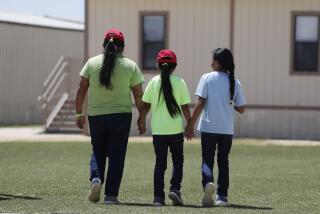When faith is a barrier to care
- Share via
The Roman Catholic Church and its affiliated nonprofit organizations have every right to hold true to their religious convictions while doing good works. But when a nonprofit, religious or not, is carrying out the government’s work with government money, it must to do so on the government’s terms.
The House Committee on Oversight and Government Reform should keep that in mind Thursday as its members take up the issue of federal grants intended to help the victims of human trafficking build new lives. Some congressional Republicans are, strangely, accusing the Obama administration of religious discrimination because the Department of Health and Human Services did not offer a grant to a Catholic organization to continue its work on behalf of trafficking victims, which includes providing counseling, housing, legal and medical assistance.
What that work doesn’t include is providing, or referring clients for, contraceptive and abortion services, which would run counter to Catholic tenets. So, although the U.S. Conference of Catholic Bishops had received government funding since 2006 to help such victims, it was passed over in the new round of grants, which went to three other organizations. The bishops’ conference ranked highly overall among the applicants, but it could not expect to win when it was unwilling to provide high-priority medical services.
The federal agency warned applicants earlier this year that “strong preference” for $4.5 million in antitrafficking grants would be given to those that provided the full range of family planning services to victims, who were brought to this country either as unwilling workers in the sex trade or to perform forced labor. It should go without saying that the victims of sex crimes must be offered all possible services related to reproductive health. And there is nothing discriminatory about requiring all applicants to meet the agency’s specifications.
It is the government’s job to determine which services will or will not be offered under public programs. As a lawsuit brought against the federal government by the American Civil Liberties Union contends, the Department of Health and Human Services indirectly promotes the viewpoints of some religions when it allows faith-based nonprofit groups to set their own agendas with taxpayer money. A hearing on the suit was held in U.S. District Court in October; a ruling is pending.
Clients of government-sponsored services should not receive significantly different levels of service depending on which organization they happen to be assigned to. Faith-based groups that want a share of government grants and contracts must be willing to do all the work the government outlines, not just what conforms to their religious doctrines.
More to Read
A cure for the common opinion
Get thought-provoking perspectives with our weekly newsletter.
You may occasionally receive promotional content from the Los Angeles Times.






